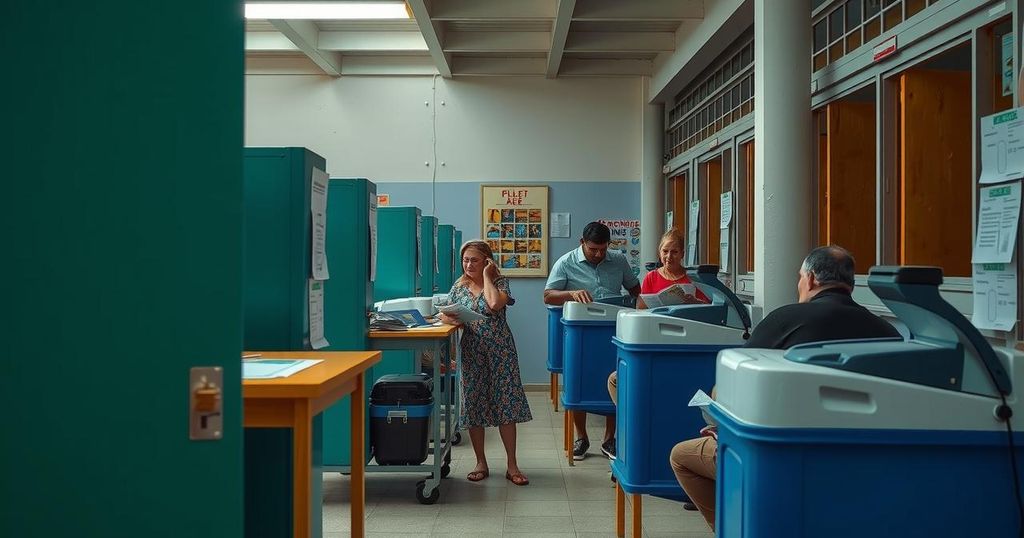Politics
AFRICA, ALLIANCE FOR CHANGE, AP, BRITAIN, CORRUPTION, DEMOCRACY, GOVERNANCE, GOVERNMENT, JOHANNESBURG, LA SENTINELLE, LABOUR PARTY, MAURITIUS, MOUVEMENT MILITANT MAURICIEN, NAVIN RAMGOOLAM, NAVIN RAMGOOLAN, PORT LOUIS, PR, PRAVIND JAGNAUTH, PRAVIND JUGNAUTH, SAHARAN AFRICA, SEYCHELLES, SOUTH AFRICA
Marcus Li
0 Comments
Mauritius Elections: Ruling Party Seeks Second Term Amid Controversies
Mauritius held parliamentary elections on November 10, 2024, where Prime Minister Pravind Jugnauth aimed for a second term amid criticism over a temporary social media ban following a wiretapping scandal. With over one million registered voters, this election is crucial to the island’s democratic process and reflects its successful economy and quality of life rankings on the Human Development Index.
Citizens of Mauritius participated in parliamentary elections on November 10, 2024, striving to secure a second term in office for Prime Minister Pravind Jugnauth’s ruling party. This election marks a significant political event in what is recognized as one of Africa’s most stable democracies. Prime Minister Jugnauth’s administration has recently faced criticism after implementing a temporary ban on social media platforms, a response to a wiretapping scandal involving leaked recordings of prominent figures. Although the ban was rescinded shortly thereafter, it heightened concerns regarding governmental transparency and freedom of expression among both the opposition and civil society. With over one million registered voters, the election serves as the twelfth since Mauritius gained independence in 1968. The current ruling party, the Militant Socialist Movement, previously led by Jugnauth, dominated the 2019 elections, forming a majority in Parliament against opposition factions, including the Alliance for Change, headed by Navin Ramgoolam. Mauritius, an island located approximately 2,000 kilometers off the eastern coast of Africa, enjoys a thriving economy driven by tourism, finance, and agriculture. It is notably recognized for its picturesque beaches and consistently ranks high on the Human Development Index, emphasizing quality of life indicators such as education and income. Underlining its success story, the World Bank has referred to Mauritius as a “beacon of success for sub-Saharan Africa,” emphasizing the island nation’s economic strides since independence. However, it has faced challenges, particularly from the COVID-19 pandemic, which impacted its tourism sector. For this election, voters will cast ballots for 62 parliamentary seats, with the successful party or coalition entrusted to form the government and appoint the prime minister. An additional eight legislators will be nominated by the Electoral Supervisory Council.
Mauritius, known for its political stability and economic growth, operates under a parliamentary democracy established following its independence from British colonial rule in 1968. Since then, the nation has conducted regular elections, with this being the twelfth instance. The island’s governance has been marked by a vibrant political landscape featuring significant parties such as the Militant Socialist Movement and the Mouvement Militant Mauricien. Economic progress has remained a central theme of Mauritian society, with diverse sectors contributing to its resilience as a middle-income nation. The Human Development Index reflects citizens’ quality of life, showcasing Mauritius’s advancements in education and healthcare as vital components of its national identity.
The recent parliamentary elections in Mauritius present a critical juncture for the ruling party, as it seeks to reaffirm Prime Minister Pravind Jugnauth’s leadership amidst challenges related to recent governmental policies and societal debates on civil liberties. With an electorate exceeding one million and significant international recognition for its economic achievements, the outcome is likely to reverberate beyond immediate political affiliations, affecting the broader socio-economic landscape of the nation. The election process, intrinsic to Mauritius’s democratic fabric, will ultimately determine the direction of its governance for the next five years.
Original Source: apnews.com




Post Comment